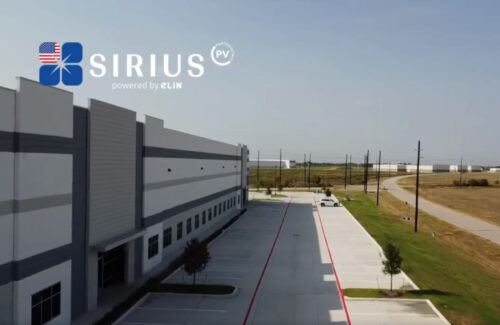If solar tradeshows had themes, RE+ 2023 was the year of U.S. manufacturing claims. Instead of the latest solar panel technologies, everyone wanted to talk about where the products were manufactured.

The Texas factory from a company video shared on LinkedIn.
One exhibitor that said it was starting manufacturing in the United States was Elin Energy, a Turkish solar panel maker that has only supplied the European market at this point. Unfamiliar with the brand, this Solar Power World reporter set up a Zoom meeting with the company, and after seeing, via a video conference, the inside of a factory under construction, I can confidently state that this site is real.
Elin Energy is currently outfitting a 250,000-sq.-ft building in Brookshire, Texas, with insulation and adequate HVAC to run solar panel assembly equipment. The company plans to install assembly lines by the end of the year. The site outside Houston will have the room to support 2 GW of annual capacity although VP Ercan Kalafat acknowledges it will take some time to reach its full potential.
“We know from experience that by Day 1, we will be a lot smaller than that,” he said. “We will work through a testing phase before ramping up. Hopefully within a year we can go to 2 GW once everything is perfected and everyone knows what they’re doing.”
Elin does have experience with making solar panels. The company started as an energy contractor in the 1980s before getting into solar panel manufacturing in 2017. Kalafat told Solar Power World that Elin has three factories in Turkey with an annual capacity of 3.5 GW. According to reporting by PV Magazine and independent PV consultant Kaangokay, Elin was estimated to have close to 1 GW of production capacity earlier this year. Elin initially did a lot of OEM work, including making panels for Seraphim at its Ankara factory, but the company has since transitioned to promoting its own panel brand: Sirius.
Sirius solar panels for the U.S. market are expected to first roll off the Texas lines by mid-2024. The company will initially make solar panels for the residential market as the company — and industry — waits for final domestic content bonus credits to be better established for the utility-scale market.
“Without [domestic content credits], we believe it’s very hard to compete with the Chinese market and Chinese products. But in time, we hope to have a supply chain where we can surpass that 40% local content. And by that time, we hope to have educated local talent [for manufacturing],” Kalafat said.
Elin is translating its Turkish production materials into both English and Spanish to better train applicants at its Texas factory.
“The biggest challenge is to educate the right people and create an environment of talent,” Kalafat said. “We had the same story back in Turkey when we started. Nobody knew anything, the technology had to come from somewhere and those people had to bring in people to educate the local people. We’re just redoing it over here, but it takes time. The facility will employ roughly 500 people, and only 20 of these people are experienced and coming in from Europe. So it will take time.”
Kalafat said Elin first decided to invest in U.S. manufacturing after attending a Select USA summit hosted by the U.S. Dept. of Commerce last year. The government program focuses on facilitating job-creating business investment within the United States.
“We were already thinking about it,” Kalafat said of working in the United States, “but they convinced us to be more committed. We have many incentives in Turkey, as well. We had some kind of protection from China, and that’s why we could flourish. When the government has the same mentality, to protect your business, we want to be there. We believe that the United States will protect its investors.”
Elin Energy joins a number of brands starting solar panel manufacturing operations in Texas, including Canadian Solar, Trina Solar and SEG Solar.



















